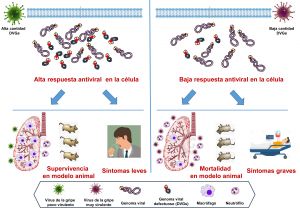Flu viruses have defective genetic material that can activate the infected patient’s immune system, and lower levels of these molecules can increase the severity of the virus infection. This is the main conclusion reached by researchers from the Centre for Biomedical Research in Respiratory Diseases Network (CIBERES) and in the laboratory of Dr. Amelia Nieto at the Centro Nacional de Biotecnología of the CSIC (CNB-CSIC), in a study led by Dr. Ana Falcón that has just been published in the journal PLOS Pathogens.
Influenza is particularly dangerous for babies, the elderly, and people with underlying medical conditions, although healthy people can also suffer a serious infection. Of the many flu virus strains that circulate every year, some are more virulent than others. "So far we have found severity markers for specific strains, but not a more general marker like this, which applies to many strains and would be more useful in clinical decision-making and in the design of prevention strategies," explains Falcón.
To identify this marker, scientists from CIBERES and the CNB-CSIC, in collaboration with other health and research institutions, centred on defective viral genomes (DVG). These molecules, which consist of viral RNA fragments with defective genetic information, are found in many influenza virus strains.
Previous studies suggested that DVG activate the immune system in infected animals, and could restrict the severity of influenza infection; in this study, the scientists tested whether these molecules could serve as a general marker of influenza severity.
The validity of the marker was tested in infected mice and in cell cultures of human respiratory tissue with different strains of influenza A H1N1 virus, the subtype responsible for the 2009 influenza pandemic. The results showed that strains with lower DVG accumulation in cell cultures produced a more serious infection in mice.
The team also analyzed the genomes of viruses isolated from samples from people who had a severe infection or died from the flu during the 2009 "swine flu" pandemic, or in later flu outbreaks with similar characteristics. They found that H1N1 strains that caused severe symptoms had significantly less DVG accumulation than influenza A strains from people who had only mild symptoms.
Overall, these results suggest that low DVG levels indicate an increased risk of serious illness in patients infected with the influenza A virus. With more research, these findings could help predict flu severity, guide patient treatment, and prompt new flu prevention strategies.
- Jasmina Vasilijevic, Noelia Zamarreño, Juan Carlos Oliveros, Ariel Rodríguez-Frandsen, Guillermo Gómez, Guadalupe Rodríguez, Mercedes PeÂrez-Ruiz, Sonia Rey, Isabel Barba, Francisco Pozo, Inmaculada Casas, Amelia Nieto, Ana Falcón. Reduced accumulation of defective viral genomes contributes to severe outcome in influenza virus infected patients. Plos Pathogens 2017 https://doi.org/10.1371/journal.ppat.1006650






